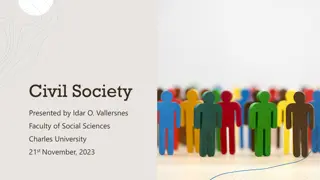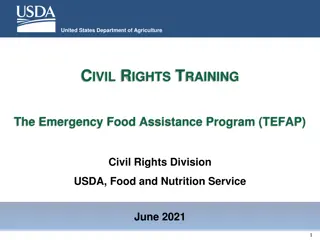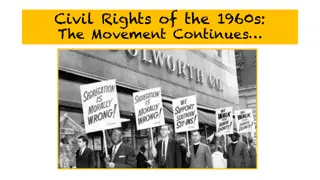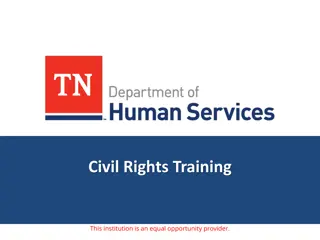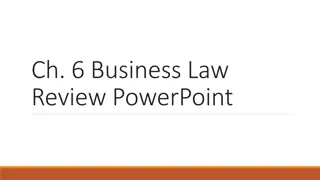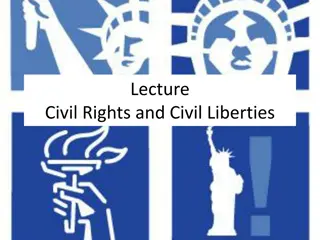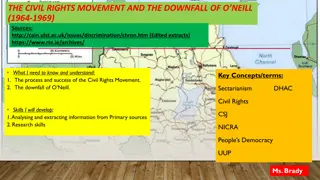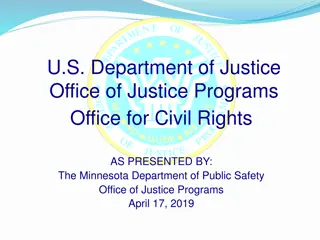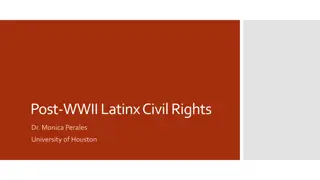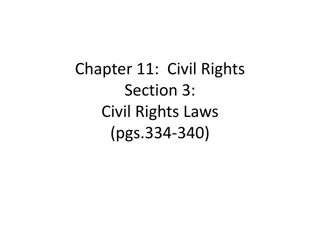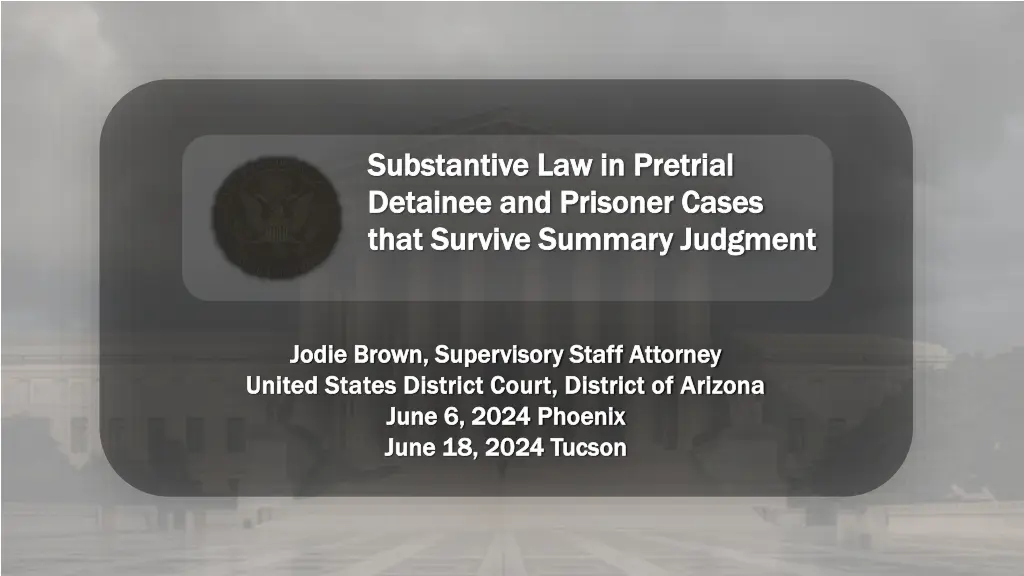
Pretrial Detainee Rights in Substantive Law: Fourteenth Amendment Claims
Understand the rights of pretrial detainees under the Fourteenth Amendment, including their due process rights against punishment prior to guilt adjudication and the criteria for determining governmental actions as punitive. Explore cases and legal principles relevant to pretrial detainee claims.
Download Presentation

Please find below an Image/Link to download the presentation.
The content on the website is provided AS IS for your information and personal use only. It may not be sold, licensed, or shared on other websites without obtaining consent from the author. If you encounter any issues during the download, it is possible that the publisher has removed the file from their server.
You are allowed to download the files provided on this website for personal or commercial use, subject to the condition that they are used lawfully. All files are the property of their respective owners.
The content on the website is provided AS IS for your information and personal use only. It may not be sold, licensed, or shared on other websites without obtaining consent from the author.
E N D
Presentation Transcript
Substantive Law in Pretrial Substantive Law in Pretrial Detainee and Prisoner Cases Detainee and Prisoner Cases that Survive Summary Judgment that Survive Summary Judgment Jodie Brown, Supervisory Staff Attorney Jodie Brown, Supervisory Staff Attorney United States District Court, District of Arizona United States District Court, District of Arizona June 6, 2024 Phoenix June 6, 2024 Phoenix June 18, 2024 Tucson June 18, 2024 Tucson
Agenda Agenda Pretrial Detainee Fourteenth Amendment Claims: Medical Care, Conditions of Confinement, Excessive Force, Failure to Protect, Procedural Due Process Prisoner Eighth Amendment Claims: Medical Care, Conditions of Confinement, Excessive Force, Failure to Protect/Threat to Safety, Substantive and Procedural Due Process Religious Exercise Claims: First Amendment and RLUIPA Access to the Courts ADA/RA Federal Prisoners: Bivens and FTCA Questions o o o o o o o
Pretrial Detainee Pretrial Detainee Fourteenth Amendment Claims Fourteenth Amendment Claims A pretrial detainee has a substantive due process right against restrictions that amount to punishment for a criminal offense prior to an adjudication of guilt. Valdez v. Rosenbaum, 302 F.3d 1039, 1045 (9th Cir. 2002); Bell v. Wolfish, 441 U.S. 520, 535 (1979). [P]unishment can consist of actions taken with an expressed intent to punishment, but in the absence of expressed intent, a plaintiff can nevertheless prevail by showing that the actions are not rationally related to a legitimate nonpunitive governmental purpose or that the actions appear excessive in relation to that purpose. Kingsley v. Hendrickson, 576 U.S. 389, 398 (2015) (quoting Bell, 441 U.S. at 538, 561). This is an objective standard. Id. o o
Pretrial Detainee Pretrial Detainee Fourteenth Amendment Claims Fourteenth Amendment Claims For a particular governmental action to constitute punishment, (1) that action must cause the detainee to suffer some harm or disability, and (2) the purpose of the governmental action must be to punish the detainee. Demery v. Arpaio, 378 F.3d 1020, 1029 (9th Cir. 2004) (quoting Bell, 441 U.S. at 538). The harm or disability suffered must either significantly exceed, or be independent of, the inherent discomforts of confinement. Vazquez v. Cnty. of Kern, 949 F.3d 1153, 1163 (9th Cir. 2020). Punishment can take several forms, including inadequate medical care, unconstitutional jail conditions, and due process violations in disciplinary proceedings. o o o
Pretrial Detainee Pretrial Detainee Fourteenth Amendment Fourteenth Amendment Medical Care Claims Medical Care Claims A pretrial detainee s claim that he has been denied adequate medical care is evaluated under an objective deliberate indifference standard. Gordon v. County of Orange, 888 F.3d 1118, 1124 25 (9th Cir. 2018). o A plaintiff must show that the denial, delay, or otherwise unreasonable course of medical care was taken in reckless disregard of an excessive risk to the plaintiff s health or safety. Id. at 1125. o
Pretrial Detainee Pretrial Detainee Fourteenth Amendment Fourteenth Amendment Medical Care Claims Medical Care Claims The elements of a pretrial detainee s medical care claim against an individual defendant are: (i) the defendant made an intentional decision with respect to the conditions under which the plaintiff was confined; (ii) those conditions put the plaintiff at substantial risk of suffering serious harm; (iii) the defendant did not take reasonable available measures to abate that risk, even though a reasonable official in the circumstances would have appreciated the high degree of risk involved making the consequences of the defendant s conduct obvious; and (iv) by not taking such measures, the defendant caused the plaintiff s injuries. Gordon, 888 F.3d at 1125.
Pretrial Detainee Pretrial Detainee Fourteenth Amendment Fourteenth Amendment Medical Care Claims Medical Care Claims The mere lack of due care by a state official does not deprive an individual of life, liberty, or property under the Fourteenth Amendment. Castro v. Cnty. of Los Angeles, 833 F.3d 1060, 1071 (9th Cir. 2016) (quoting Daniels v. Williams, 474 U.S. 327, 330-31 (1986)). o
Pretrial Detainee Pretrial Detainee Fourteenth Amendment Fourteenth Amendment Conditions of Confinement Claims Conditions of Confinement Claims Pretrial detainees are entitled to adequate food, clothing, shelter, sanitation, medical care, and personal safety. Alvarez- Machain v. United States, 107 F.3d 696, 701 (9th Cir. 1996) (quoting Hoptowit v. Ray, 682 F.2d 1237, 1246 (9th Cir. 1982)). Pre-adjudication detainees retain greater liberty protections than convicted prisoners. Bell, 441 U.S. at 535-56. But the Constitution does not mandate comfortable prisons, Rhodes v. Chapman, 452 U.S. 337, 349 (1981), and conditions of confinement may be, and often are, restrictive and harsh, Morgan v. Morgensen, 465 F.3d 1041, 1045 (9th Cir. 2006). o o
Pretrial Detainee Pretrial Detainee Fourteenth Amendment Fourteenth Amendment Conditions of Confinement Claims Conditions of Confinement Claims Common Complaints: o Exercise: [T]he Constitution requires jail officials to provide outdoor recreation opportunities, or otherwise meaningful recreation, to prison inmates. Shorter v. Baca, 895 F.3d 1176, 1185 (9th Cir. 2018). A prohibition on outdoor exercise of six weeks is a sufficiently serious deprivation to support a constitutional claim. Thomas v. Ponder, 611 F.3d 1144, 1151 (9th Cir. 2010). o Food: The Fourteenth Amendment requires only that prisoners receive food that is adequate to maintain health; it need not be tasty or aesthetically pleasing. LeMaire v. Maass, 12 F.3d 1444, 1456 (9th Cir. 1993). However, a detainee may state a claim where he alleges he is served meals with insufficient calories for long periods of time.
Pretrial Detainee Pretrial Detainee Fourteenth Amendment Fourteenth Amendment Conditions of Confinement Claims Conditions of Confinement Claims Common Complaints: o Overcrowding: overcrowding alone does not violate the Fourteenth Amendment, but if overcrowding results in some unconstitutional condition, such as increased stress, tension, communicable diseases, and confrontations between detainees, a plaintiff might have a cognizable claim. See Akao v. Shimoda, 832 F.2d 119, 120 (9th Cir. 1987). o Cleanliness/Sanitation: o COVID-19 pandemic presented unique challenges.
Pretrial Detainee Pretrial Detainee Fourteenth Amendment Fourteenth Amendment Excessive Force Claims Excessive Force Claims o The Fourteenth Amendment s Due Process Clause, and not the The Fourteenth Amendment s Due Process Clause, and not the Eighth Amendment, applies to the use of excessive force against Eighth Amendment, applies to the use of excessive force against pretrial detainees. pretrial detainees. Kingsley v. Hendrickson Kingsley v. Hendrickson, 576 U.S. 389, 397 (2015). (2015). o In this context, force is considered excessive if the officers use of In this context, force is considered excessive if the officers use of force was objectively unreasonable in light of the facts and force was objectively unreasonable in light of the facts and circumstances confronting them, without regard to their mental circumstances confronting them, without regard to their mental state. state. Id. Id. , 576 U.S. 389, 397
Pretrial Detainee Pretrial Detainee Fourteenth Amendment Fourteenth Amendment Excessive Force Claims Excessive Force Claims Factors for Reasonableness of Force Factors for Reasonableness of Force In determining whether the use of force was reasonable, a court In determining whether the use of force was reasonable, a court should consider factors including, but not limited to: should consider factors including, but not limited to: the relationship between the need for the use of force and the the relationship between the need for the use of force and the amount of force used; the extent of the plaintiff s injury; any amount of force used; the extent of the plaintiff s injury; any effort made by the officer to temper or to limit the amount of effort made by the officer to temper or to limit the amount of force; the severity of the security problem at issue; the threat force; the severity of the security problem at issue; the threat reasonably perceived by the officer; and whether the plaintiff reasonably perceived by the officer; and whether the plaintiff was actively resisting. was actively resisting.
Pretrial Detainee Pretrial Detainee Fourteenth Amendment Fourteenth Amendment Failure to Protect Claims Failure to Protect Claims o The elements of a claim based on failure to protect a detainee are: The elements of a claim based on failure to protect a detainee are: (1) (1) The defendant made an intentional decision with respect to the conditions The defendant made an intentional decision with respect to the conditions under which the detainee was confined; under which the detainee was confined; (2) (2) Those conditions put the detainee at substantial risk of suffering serious Those conditions put the detainee at substantial risk of suffering serious harm; harm; (3) (3) The defendant did not take reasonable available measures to abate that risk, The defendant did not take reasonable available measures to abate that risk, even though a reasonable officer in the circumstances would have even though a reasonable officer in the circumstances would have appreciated the high degree of risk involved appreciated the high degree of risk involved making the consequences of the defendant s conduct obvious; and defendant s conduct obvious; and (4) (4) By not taking such measures, the defendant caused the plaintiff s injuries. By not taking such measures, the defendant caused the plaintiff s injuries. making the consequences of the Castro Castro, 833 F.3d at 1071. , 833 F.3d at 1071.
Pretrial Detainee Pretrial Detainee Fourteenth Amendment Fourteenth Amendment Due Process Claims Due Process Claims Procedural due process in disciplinary proceedings requires that a detainee receive (1) written notice of the charges, no less than 24 before the hearing; (2) a written statement by the factfinders as to the evidence relied on and reasons for the disciplinary action; and (3) a limited right to call witnesses and present documentary evidence when it would not be unduly hazardous to institutional safety or correctional goals to allow the detainee to do so. Wolff v. McDonnell, 418 U.S. 539, 565-66 (1974). o
Pretrial Detainee Pretrial Detainee Fourteenth Amendment Fourteenth Amendment Due Process Claims Due Process Claims Due process requires simply that there be some evidence to support the findings made in the disciplinary hearing. Superintendent v. Hill, 472 U.S. 445, 457 (1985). Prison officials cannot meet the some evidence requirement if the evidence lacks sufficient indicia of reliability. Jones-Heim v. Reed, 241 F. App x 359, 360 (9th Cir. 2007) (quoting Cato v. Rushen, 824 F.2d 703, 705 (9th Cir. 1987)). The Court may not make its own assessment of the credibility of witnesses or reweigh the evidence; rather, the only relevant question is whether there is any evidence the record that could support the conclusion reached by the disciplinary board. Jones-Heim, 241 F. App x at 360 (quoting Hill, 472 U.S. at 455-56) (emphasis in original). o o
Convicted Prisoner Convicted Prisoner Eighth Amendment Eighth Amendment Deliberate Indifference Deliberate Indifference The Eighth Amendment prohibits the imposition of cruel and unusual punishments and embodies broad and idealistic concepts of dignity, civilized standards, humanity and decency. Estelle v. Gamble, 429 U.S. 97, 102 (1976).
Convicted Prisoner Convicted Prisoner Eighth Amendment Eighth Amendment Medical Care Claims Medical Care Claims The government has an obligation to provide medical care for those whom it punishes by incarceration. Estelle v. Gamble, 429 U.S. 97, 103 (1976).
Convicted Prisoner Convicted Prisoner Eighth Amendment Eighth Amendment Medical Care Claims Medical Care Claims Mere negligence or medical malpractice does not violate the Constitution. See Broughton v. Cutter Labs., 622 F.2d 458, 460 (9th Cir. 1980); see also Toguchi v. Chung, 391 F.3d 1051, 1057 (9th Cir. 2004). o Not even gross negligence is sufficient. Failing to perceive the risk, while nothing to commend, does not give rise to an Eighth Amendment claim. o
Convicted Prisoner Convicted Prisoner Eighth Amendment Eighth Amendment Medical Care Claims Medical Care Claims A difference of opinion as to the appropriate medical treatment does not establish deliberate indifference. See Sanchez v. Vild, 891 F.2d 240, 242 (9th Cir. 1989). o o Thus, when an inmate disagrees with a treatment plan, or even when two physicians disagree, there is no deliberate indifference claim.
Convicted Prisoner Convicted Prisoner Eighth Amendment Eighth Amendment Medical Care Claims Medical Care Claims When a physician prescribes certain treatment and it is not provided, or it is vetoed by administrative staff or a non-physician, that may give rise to a valid claim. See Colwell v. Bannister, 763 F.3d 1060, 1069 (9th Cir. 2014) (denying summary judgment where prison officials ignored the recommendations of treating specialists and instead relied on the opinions of non-specialist and non-treating medical officials who made decisions based on an administrative policy ); Snow v. McDaniel, 681 F.3d 978, 988 (9th Cir. 2012) (where the treating physician and specialist recommended surgery, a reasonable jury could conclude that it was medically unacceptable for the non-treating, non-specialist physicians to deny recommendations for surgery), overruled in part on other grounds by Peralta, 744 F.3d at 1083; Jones v. Simek, 193 F.3d 485, 490 (7th Cir. 1999) (the defendant physician s refusal to follow the advice of treating specialists could constitute deliberate indifference to serious medical needs).
Convicted Prisoner Convicted Prisoner Eighth Amendment Eighth Amendment Medical Care Claims Medical Care Claims Elements Elements Objective Standard Objective Standard: A prisoner must show a serious medical need. Subjective Standard: Subjective Standard: A prisoner must show that the defendant s response to that need was deliberately indifferent.
Convicted Prisoner Convicted Prisoner Eighth Amendment Eighth Amendment Medical Care Claims Medical Care Claims Objective Standard Objective Standard Examples of a serious medical Examples of a serious medical need include [t]he existence of need include [t]he existence of an injury that a reasonable an injury that a reasonable doctor or patient would find doctor or patient would find important and worthy of important and worthy of comment or treatment; the comment or treatment; the presence of a medical condition presence of a medical condition that significantly affects an that significantly affects an individual s daily activities; or the individual s daily activities; or the existence of chronic and existence of chronic and substantial pain. substantial pain. McGuckin 974 F.2d at 1059 974 F.2d at 1059- -60. A serious medical need exists if the failure to treat a prisoner s condition could result in further significant injury or the unnecessary and wanton infliction of pain. McGuckin v. Smith, 974 F.2d 1050, 1059 (9th Cir. 1992), overruled on other grounds, WMX Techs., Inc. v. Miller, 104 F.3d 1133, 1136 (9th Cir. 1997) (en banc) (internal citation omitted). McGuckin, , 60.
Convicted Prisoner Convicted Prisoner Eighth Amendment Eighth Amendment Medical Care Claims Medical Care Claims Subjective Standard Subjective Standard First, the prisoner must show that the defendant was aware of the serious medical need and the risk to the First, the prisoner must show that the defendant was aware of the serious medical need and the risk to the prisoner s health and safety. prisoner s health and safety. o Next, the prisoner must show a purposeful act or failure to respond to the prisoner s medical need. Next, the prisoner must show a purposeful act or failure to respond to the prisoner s medical need. Indifference may be shown when a prison official denies, delays, or intentionally interferes with medical Indifference may be shown when a prison official denies, delays, or intentionally interferes with medical treatment, or by the way in which the official provides medical care. treatment, or by the way in which the official provides medical care. Jett omitted). omitted). o Jett, 439 F.3d at 1096 (citations , 439 F.3d at 1096 (citations o Finally, the prisoner must demonstrate harm caused by the indifference. Finally, the prisoner must demonstrate harm caused by the indifference. Jett Pain can be sufficient. Pain can be sufficient. See See Estelle Estelle, 429 U.S. at 103 (Eighth Amendment applies even to less serious , 429 U.S. at 103 (Eighth Amendment applies even to less serious cases, [where] denial of medical care may result in pain and suffering which no one suggests would cases, [where] denial of medical care may result in pain and suffering which no one suggests would serve any penological purpose ); serve any penological purpose ); Jett Jett, 439 F.3d at 1097 , 439 F.3d at 1097- -98 (finding sufficient evidence of harm caused by 6 6- -month delay in surgery for fractured thumb where the prisoner s thumb healed improperly); month delay in surgery for fractured thumb where the prisoner s thumb healed improperly); McGuckin 974 F.2d at 1060 (pain and anguish suffered by prisoner constituted harm sufficient to support a 974 F.2d at 1060 (pain and anguish suffered by prisoner constituted harm sufficient to support a 1983 action). action). Jett, 439 F.3d at 1096. , 439 F.3d at 1096. 98 (finding sufficient evidence of harm caused by McGuckin, , 1983
Convicted Prisoner Convicted Prisoner Eighth Amendment Eighth Amendment Medical Care Claims Medical Care Claims Case Example Case Example Plaintiff reported rectal bleeding and history of colon polyps at intake in 2018. In Plaintiff reported rectal bleeding and history of colon polyps at intake in 2018. In 2019, he experienced a 32 2019, he experienced a 32- -pound unintentional weight loss and reported chronic pound unintentional weight loss and reported chronic constipation and abdominal pain. Plaintiff reported worsening symptoms until constipation and abdominal pain. Plaintiff reported worsening symptoms until February 2020, when he was found to have terminal rectal cancer. Plaintiff filed February 2020, when he was found to have terminal rectal cancer. Plaintiff filed suit in February 2021 and passed away in August 2023, while the case was still suit in February 2021 and passed away in August 2023, while the case was still pending. Defendants Motion for Summary Judgment was denied as to two Eighth pending. Defendants Motion for Summary Judgment was denied as to two Eighth Amendment medical care claims, and the case is ongoing with a personal Amendment medical care claims, and the case is ongoing with a personal representative. representative.
Convicted Prisoner Convicted Prisoner Eighth Amendment Eighth Amendment Medical Care Claims Medical Care Claims Medical Monell Claims To prevail on a claim against a municipality or private entity serving a traditional public function, a plaintiff must meet the test articulated in Monell v. Department of Social Services of City of New York, 436 U.S. 658, 690-94 (1978); see alsoTsao v. Desert Palace, Inc., 698 F.3d 1128, 1139 (9th Cir. 2012) (applying Monell to private entities acting under color of state law). To make this showing, Plaintiff must demonstrate that (1) he was deprived of a constitutional To make this showing, Plaintiff must demonstrate that (1) he was deprived of a constitutional right; (2) right; (2) the entity had a policy or custom; (3) the entity had a policy or custom; (3) the policy or custom amounted to deliberate the policy or custom amounted to deliberate indifference to the plaintiff s constitutional right; and (4) the policy or custom was the moving indifference to the plaintiff s constitutional right; and (4) the policy or custom was the moving force behind the constitutional violation. force behind the constitutional violation. Mabe Mabe v. San Bernardino Servs. Servs., 237 F.3d 1101, 1110 , 237 F.3d 1101, 1110- -11 (9th Cir. 2001). 11 (9th Cir. 2001). v. San Bernardino Cnty Cnty., Dep t of Pub. Soc. ., Dep t of Pub. Soc.
Convicted Prisoner Convicted Prisoner Eighth Amendment Eighth Amendment Medical Care Claims Medical Care Claims Proving a pattern or custom Although [l]iability for improper custom may not be predicated on isolated or sporadic incidents, Trevino v. Gates, 99 F.3d 911, 918 (9th Cir. 1996), evidence of a custom could be inferred from a pattern of behavior toward a single individual. See Oyenik v. Corizon Health Inc., No. 15-16850, 2017 WL 2628901, at *2 (9th Cir. June 19, 2017) (citing Oviatt By & Through Waugh v. Pearce, 954 F.2d 1470, 1478 (9th Cir. 1992)).
Convicted Prisoner Convicted Prisoner Eighth Amendment Eighth Amendment Conditions of Confinement Claims Conditions of Confinement Claims Elements of an Eighth Amendment conditions-of-confinement claim: (1) A plaintiff must allege a constitutional deprivation that is objectively sufficiently serious such that the official s act or omission must result in the denial of the minimal civilized measure life s necessities. (2) The official must have acted with deliberate indifference to prisoner health or safety. In this context, deliberate indifference is subjective: the official must both be aware of facts from which the inference could be drawn that a substantial risk of serious harm exists, and he must also draw the inference.
Convicted Prisoner Convicted Prisoner Eighth Amendment Eighth Amendment Conditions of Confinement Claims Conditions of Confinement Claims Common claims: sexual harassment, abuse, assault by prison officials Physical sexual assault on a prisoner by a prison official violates the Eighth Amendment. A prisoner presents a viable Eighth Amendment claim where he proves that a prison official, acting under color of law and without legitimate penological justification, touched the prisoner in a sexual manner or otherwise engaged in sexual conduct for the official s own sexual gratification, or for the purpose of humiliating, degrading, or demeaning the prisoner. Bearchild v. Cobbin, 947 F.3d 1130, 1144 (9th Cir. 2020).
Convicted Prisoner Convicted Prisoner Eighth Amendment Eighth Amendment Conditions of Confinement Claims Conditions of Confinement Claims Verbal Harassment Generally, gawking, pointing, joking, and mere verbal harassment or abuse, even with sexual undertones or of a sexual nature does not violate the Eighth Amendment. But one district court concluded that a plaintiff stated an Eighth Amendment claim where the plaintiff s allegations supported an inference that an officer s verbal harassment was calculated to and in fact caused him psychological damage, and the officer persisted with the verbal harassment over several years and despite multiple attempts by plaintiff to get him to stop. Baker v. Grant, 2018 WL 3466956 (W.D. Wash. June 1, 2018).
Convicted Prisoner Convicted Prisoner Eighth Amendment Eighth Amendment Conditions of Confinement Claims Conditions of Confinement Claims Opposite-Sex Officers Isolated instance of a female officer viewing a male prisoner s genitalia does not amount to an Eighth Amendment violation. Eighth Amendment does not prohibit female officers from performing visual body cavity searches on male prisoners or watching male prisoners shower. But the Ninth Circuit has suggested that up close, frequent, and intentional viewings by guards of the opposite sex could violate a prisoner s privacy rights. See Somers v. Thurman, 109 F.3d 614 (9th Cir. 1997).
Convicted Prisoner Convicted Prisoner Eighth Amendment Eighth Amendment Excessive Force Claims Excessive Force Claims o When a prisoner claims that prison officials violated his Eighth Amendment When a prisoner claims that prison officials violated his Eighth Amendment rights by using excessive physical force, the relevant inquiry is whether rights by using excessive physical force, the relevant inquiry is whether force was applied in a good force was applied in a good- -faith effort to maintain or restore discipline, or faith effort to maintain or restore discipline, or maliciously and sadistically to cause harm. maliciously and sadistically to cause harm. Hudson v. McMillian 1, 7 (1992). 1, 7 (1992). o The use of excessive force against a prisoner may constitute cruel and The use of excessive force against a prisoner may constitute cruel and unusual punishment [even] when the inmate does not suffer serious injury. unusual punishment [even] when the inmate does not suffer serious injury. Id. Id. at 8 at 8- -9. 9. o However, the Eighth Amendment does not recognize claims based on a de However, the Eighth Amendment does not recognize claims based on a de minimis use of force unless the force is of a sort repugnant to the minimis use of force unless the force is of a sort repugnant to the conscience of mankind. conscience of mankind. Id. Id. at 9 at 9- -10. 10. Hudson v. McMillian, 503 U.S. , 503 U.S.
Convicted Prisoner Convicted Prisoner Fourteenth Amendment Fourteenth Amendment Due Process Claims Due Process Claims Two step analysis for due process claims: (1)Whether the prisoner was deprived of a protected liberty or property interest. (2)Whether that deprivation was accompanied by sufficient procedural protections.
Convicted Prisoner Convicted Prisoner Fourteenth Amendment Fourteenth Amendment Due Process Claims Due Process Claims Protected Liberty or Property Interest (1) A liberty interest may arise from the Constitution itself, or it may arise from an expectation or interest created by state laws or policies. (2) The Constitution does not give rise to a liberty interest in avoiding transfer to more adverse conditions of confinement, but such an interest may arise from state policies or regulations. (3) An interest in avoiding certain conditions of confinement will generally be limited to freedom from restraint that imposes an atypical and significant hardship on the prisoner in relation to the ordinary incidents of prison life.
Convicted Prisoner Convicted Prisoner Fourteenth Amendment Fourteenth Amendment Due Process Claims Due Process Claims Protected Liberty or Property Interest (1) In the disciplinary context, the Court looks to the sanctions imposed to determine if there is a protected liberty interest that implicates due process. (2) Temporary solitary confinement; loss of privileges, such as telephone, commissary, recreation, and visitation; and extra duty do not implicate due process. (3) Loss of good-time credits might implicate due process if they impact the duration of a prisoner s sentence. If a prisoner is serving a natural life sentence, loss of good-time credits does not implicate a liberty interest.
Convicted Prisoner Convicted Prisoner Fourteenth Amendment Fourteenth Amendment Due Process Claims Due Process Claims Procedural protections: Mathews v. Eldridge Three-step analysis: (1) The private interest affected; (2) The risk of an erroneous deprivation and the probable value of any additional or substitute procedural safeguards; and (3) The government s interest. The fundamental requirement of due process is the opportunity to be heard at a meaningful time and in a meaningful manner.
Convicted Prisoner Convicted Prisoner Fourteenth Amendment Fourteenth Amendment Due Process Claims Due Process Claims Disciplinary Proceedings Prisoner must receive notice that is sufficient to enable him to marshal the facts and prepare a defense, including the conduct alleged, an approximate date of the alleged conduct, and the specific charge against him. Notice satisfying due process need not painstakingly detail all facts relevant to the date, place, and manner of the charged inmate misconduct; it must simply permit a reasonable person to understand what conduct is at issue so that he may identify relevant evidence and present a defense. Ashker v. Newsom, 81 F.4th 863, 879 (9th Cir. 2023).
Convicted Prisoner Convicted Prisoner Fourteenth Amendment Fourteenth Amendment Due Process Claims Due Process Claims Hearing Requirements Evidence Written findings
Convicted Prisoner Convicted Prisoner Fourteenth Amendment Fourteenth Amendment Due Process Claims Due Process Claims Case Example Johnson v. Ryan, 55 F.4th 1167 (9th Cir. 2022): Plaintiff was a former member of a security threat group who participated in ADC s step- down program, which allows prisoners to move from maximum custody to close custody. Plaintiff completed the program and moved to close custody but was removed from the program. He asserted due process claims. The Ninth Circuit determined that prisoners do not have a liberty interest in participation in the step- down program, but they do have a liberty interest in avoiding placement in or return to maximum custody. Prisoners must receive due process to be returned to maximum custody.
First Amendment First Amendment Free Exercise Free Exercise o The government shall not prohibit the free exercise of religion. U.S. Const. The government shall not prohibit the free exercise of religion. U.S. Const. amend I. amend I. o Free Free- -exercise rights are necessarily limited by the fact of incarceration, and exercise rights are necessarily limited by the fact of incarceration, and may be curtailed in order to achieve legitimate correctional goals or to may be curtailed in order to achieve legitimate correctional goals or to maintain prison security. maintain prison security. McElyea McElyea v. Babbitt v. Babbitt, 833 F.2d 196, 197 (9th Cir. 1987) (citing 1987) (citing O Lone O Lone v. Shabazz v. Shabazz, 482 U.S. 342, 348 (1987)). , 482 U.S. 342, 348 (1987)). o A prisoner s constitutional right to free exercise of religion must be A prisoner s constitutional right to free exercise of religion must be balanced against the state s right to limit First Amendment freedoms to balanced against the state s right to limit First Amendment freedoms to attain valid penological objectives such as rehabilitation of prisoners, attain valid penological objectives such as rehabilitation of prisoners, deterrence of crime, and institutional security. deterrence of crime, and institutional security. See 49. 49. , 833 F.2d 196, 197 (9th Cir. See O Lone O Lone, 482 U.S. at 348 , 482 U.S. at 348- -
First Amendment First Amendment Free Exercise Free Exercise Elements 1. 1. Show that the religious practice at issue concerns a sincerely held Show that the religious practice at issue concerns a sincerely held belief and that the claim is rooted in religious belief. belief and that the claim is rooted in religious belief. 2. 2. Demonstrate a burden to a sincerely held belief. Demonstrate a burden to a sincerely held belief. 3. 3. If the regulation or conduct at issue impinges on the plaintiff s If the regulation or conduct at issue impinges on the plaintiff s constitutional rights, it is valid if it is reasonably related to legitimate constitutional rights, it is valid if it is reasonably related to legitimate penological interests. penological interests.
First Amendment First Amendment Free Exercise Free Exercise o The Ninth Circuit has explained that [ The Ninth Circuit has explained that [i i]t is not within the judicial ken to question the centrality of particular beliefs or practices to a faith, or the question the centrality of particular beliefs or practices to a faith, or the validity of particular litigants interpretations of those creeds. validity of particular litigants interpretations of those creeds. Shakur v. Schriro Schriro, 514 F .3d 878, 884 (9th Cir. 2008) ( , 514 F .3d 878, 884 (9th Cir. 2008) (quoting 490 U.S. 680, 699 (1989)). 490 U.S. 680, 699 (1989)). o Whether Plaintiff s religious beliefs are insincere is both a question of fact Whether Plaintiff s religious beliefs are insincere is both a question of fact and a credibility determination. and a credibility determination. See See United States v. Seeger 185 (1965) (The question of sincerity is, of course, a question of fact ; 185 (1965) (The question of sincerity is, of course, a question of fact ; therefore, it cannot be decided at summary judgment); therefore, it cannot be decided at summary judgment); o Backsliding or nonobservance of a religious practice is not sufficient to Backsliding or nonobservance of a religious practice is not sufficient to establish as a matter of law that Plaintiff is insincere in his religious beliefs. establish as a matter of law that Plaintiff is insincere in his religious beliefs. See, e.g., See, e.g., White v. Linderman White v. Linderman, No. CV 11 , No. CV 11- -8152 4496364, at *5 (D. Ariz. Aug. 22, 2013). 4496364, at *5 (D. Ariz. Aug. 22, 2013). ]t is not within the judicial ken to Shakur v. quoting Hernandez v. C.I.R. Hernandez v. C.I.R., , United States v. Seeger, 380 U.S. 163, , 380 U.S. 163, 8152- -PCT PCT- -RCB, 2013 WL RCB, 2013 WL
First Amendment First Amendment Free Exercise Free Exercise o The constitutional guarantee of free exercise of religion is not limited to The constitutional guarantee of free exercise of religion is not limited to beliefs which are shared by all of the members of a religious sect. beliefs which are shared by all of the members of a religious sect. Thomas v. Review Bd. of Ind. Emp't Sec. Div. v. Review Bd. of Ind. Emp't Sec. Div., 450 U.S. 707, 715 , 450 U.S. 707, 715- -16 (1981). o Like all religions, people practice their faith in different ways and interpret Like all religions, people practice their faith in different ways and interpret religious doctrine differently. religious doctrine differently. o [R] [R]eligious eligious beliefs need not be acceptable, logical, consistent, or beliefs need not be acceptable, logical, consistent, or comprehensible to others in order to merit First Amendment protection. comprehensible to others in order to merit First Amendment protection. Thomas v. Review Bd. of Ind. Emp't Sec. Div Thomas v. Review Bd. of Ind. Emp't Sec. Div. ., 450 U.S. 707, 713 o The request, however, must be rooted in religious belief and not in purely The request, however, must be rooted in religious belief and not in purely secular philosophical concerns. secular philosophical concerns. Malik v. Brown Malik v. Brown, 16 F.3d 330, 333 (9th Cir. 1994) (internal citations omitted); 1994) (internal citations omitted); Shakur Shakur, 514 F.3d at 885. Thomas 16 (1981). , 450 U.S. 707, 713- -14 (1981). 14 (1981). , 16 F.3d 330, 333 (9th Cir. , 514 F.3d at 885.
First Amendment First Amendment Free Exercise Free Exercise To substantially burden the practice of an individual s religion, the To substantially burden the practice of an individual s religion, the interference must be more than an isolated incident or short interference must be more than an isolated incident or short- -term occurrence. occurrence. See See Canell Canell v. Lightner v. Lightner, 143 F.3d 1210, 1215 (9th Cir. 1998). Prison officials negligent or accidental actions that 1998). Prison officials negligent or accidental actions that impinge on an inmate s religious practice are insufficient to impinge on an inmate s religious practice are insufficient to support a First Amendment claim. support a First Amendment claim. See 174, 194 (4th Cir. 2006). 174, 194 (4th Cir. 2006). term , 143 F.3d 1210, 1215 (9th Cir. See Lovelace v. Lee Lovelace v. Lee, 472 F.3d , 472 F.3d
First Amendment First Amendment Free Exercise Free Exercise If a substantial burden exists, the policy is scrutinized using the If a substantial burden exists, the policy is scrutinized using the Turner v. Safely test: test: 1. 1. whether there exists a valid, rational connection between the prison whether there exists a valid, rational connection between the prison regulation and the legitimate governmental interest put forth to justify it; regulation and the legitimate governmental interest put forth to justify it; 2. 2. whether there are alternative means of exercising the regulated right whether there are alternative means of exercising the regulated right that remain open to the inmate (not narrow); that remain open to the inmate (not narrow); 3. 3. the impact that accommodation of the asserted constitutional right will the impact that accommodation of the asserted constitutional right will have upon guards, other inmates, and prison resources; and have upon guards, other inmates, and prison resources; and 4. 4. whether there exist ready alternatives that fully meet the inmate s whether there exist ready alternatives that fully meet the inmate s demands at a demands at a de minimis de minimis cost to valid penological interests. cost to valid penological interests. (burden is on the prisoner) (burden is on the prisoner) Turner v. Safely
First Amendment First Amendment Free Exercise Free Exercise Case Examples Case Examples First Amendment claim brought by Native American prisoner alleging the denial of a religious diet. Plaintiff, a First Amendment claim brought by Native American prisoner alleging the denial of a religious diet. Plaintiff, a Native American Pascua Yaqui, believed the spirit of any animal he consumes must be honored with a "Deer Native American Pascua Yaqui, believed the spirit of any animal he consumes must be honored with a "Deer Dancer Ceremony," and because that cannot be done for the meat he consumes in prison, he requested a Dancer Ceremony," and because that cannot be done for the meat he consumes in prison, he requested a vegetarian diet so that he can avoid eating meat that has not been properly honored through the Yaqui Deer vegetarian diet so that he can avoid eating meat that has not been properly honored through the Yaqui Deer Ceremony. Ceremony. o Defendant denied the diet request on the ground that Plaintiff did not have a sincerely held religious belief to Defendant denied the diet request on the ground that Plaintiff did not have a sincerely held religious belief to support his desire to eat a vegetarian diet, meaning that Plaintiff s religion did not require him to consume a support his desire to eat a vegetarian diet, meaning that Plaintiff s religion did not require him to consume a vegetarian diet. But that is not what the Ninth Circuit looks at when determining whether an inmate s religious vegetarian diet. But that is not what the Ninth Circuit looks at when determining whether an inmate s religious accommodation request is sincerely held. Just before trial was set to begin, parties entered into a settlement. accommodation request is sincerely held. Just before trial was set to begin, parties entered into a settlement. o Plaintiff sought relief from repeated disciplinary tickets for sharing kosher meal with other inmates. He alleged Plaintiff sought relief from repeated disciplinary tickets for sharing kosher meal with other inmates. He alleged that Defendants actions burdened his free exercise rights. But Plaintiff never alleged that sharing food was a that Defendants actions burdened his free exercise rights. But Plaintiff never alleged that sharing food was a tenet of his religious practice. Rather, it was a moral belief that motivated his practice, which brought his actions tenet of his religious practice. Rather, it was a moral belief that motivated his practice, which brought his actions outside the ambit of Free Exercise protection. outside the ambit of Free Exercise protection. o
RLUIPA Religious Land Use and Institutionalized Persons Act of 2000 42 U.S.C. 2000cc-1(a)(1)-(2) ( RLUIPA ) o Only applies to injunctive relief; cannot seek damages Only applies to injunctive relief; cannot seek damages o Qualified Immunity is not available as defense to a request Qualified Immunity is not available as defense to a request for injunctive relief for injunctive relief
RLUIPA Government may not impose a substantial burden on the religious exercise of a confined person unless: 1. Burden furthers a compelling governmental interest and 2. does so by the least restrictive means
RLUIPA Elements 1. Plaintiff must show that the exercise of his religion is at issue. 2. Plaintiff bears the burden of establishing a prima facie claim that the defendant s conduct substantially burdened his religious exercise. 3. If the plaintiff meets the prima facie burden, then the burden shifts to the defendant to prove that the substantial burden on the inmate s religious practice both furthers a compelling governmental interest and is the least restrictive means of doing so.
RLUIPA A substantial burden on religious exercise must impose a significantly great onus upon such exercise. Warsoldier v. Woodford, 418 F.3d 989, 995 (9th Cir. 2005). An institutionalized person s religious exercise is substantially burdened where the state denies an important benefit because of conduct mandated by religious belief, thereby putting substantial pressure on an adherent to modify his behavior and to violate his belief. Id.
RLUIPA Compelling Governmental Interest: This is a strict scrutiny standard and it difficult for defendants to meet on summary judgment. Least Restrictive Alternative: Defendants must come forward with more than assertions of generic security concerns. They must demonstrate with evidence evidence that accommodation of a particular religious request impacts a compelling interest and that they have pursued lesser restrictive means of accommodating the right without success.


